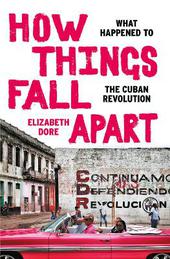
|
How Things Fall Apart: What Happened to the Cuban Revolution
Hardback
Main Details
| Title |
How Things Fall Apart: What Happened to the Cuban Revolution
|
| Authors and Contributors |
By (author) Elizabeth Dore
|
| Physical Properties |
| Format:Hardback | | Pages:352 | | Dimensions(mm): Height 234,Width 153 |
|
| Category/Genre | Oral history |
|---|
| ISBN/Barcode |
9781803283791
|
| Classifications | Dewey:972.91064 |
|---|
| Audience | |
|---|
| Illustrations |
1x8pp col
|
|
Publishing Details |
| Publisher |
Head of Zeus
|
| Imprint |
Head of Zeus
|
| Publication Date |
4 August 2022 |
| Publication Country |
United Kingdom
|
Description
A powerful account of the decline of the Cuban Revolution, told through the lives of five ordinary Cuban citizens. 'Masterful... Dore uses oral history to tell a history of Cuba from the bottom up' Professor Linda Gordon 'A vital addition to Cuba's rich oral tradition' Will Grant, BBC Cuba Correspondent 'Opens wide a window on the last forty years of Cuban history' Professor Gerald Martin 'To have gathered these life stories together with such grace, eloquence and trust is a towering achievement' Professor Ruth Behar Cuba is not the country it used to be. The regime is disintegrating, and unprecedented protest marches are challenging the gerontocratic Communist Party leadership. How Things Fall Apart reveals the decay of this political system through the lives of five ordinary Cuban citizens. Born in the 1970s and 80s, these men and women recount how their lives changed over a tumultuous stretch of thirty-five years: first when Fidel opened the country to tourism following the fall of the Soviet bloc; then when Raul Castro allowed market forces to operate, thinking it would stop the country's economic slide; and finally when President Trump's tightening of the US embargo combined with the Covid-19 pandemic to cause economic collapse. With warmth and humanity, they describe learning to survive in an environment where a tiny minority has grown rich by local standards, the great majority has been left behind, and inequality has destroyed the very things that used to give meaning to Cubans' lives. Born out of the first oral history project authorized by the Cuban government in forty years, Professor Elizabeth Dore gathers these stories to illuminate the slow and agonizing decline of the Cuban Revolution over the past four decades. For over sixty years the government controlled the historical narrative. In this book, Cubans tell their own stories.
Author Biography
Elizabeth Dore is a professor of Latin American Studies, specializing in class, race, gender and ethnicity, with a focus on modern history. She is Professor Emeritus at the University of Southampton, Associate Fellow of the Institute of the Americas, University College London, and has a PhD from Columbia University. Elizabeth is Project Director of the Oral History Project 'Memories of the Cuban Revolution' and has written extensively on Cuban history and politics.
ReviewsMasterful... Dore uses oral history to tell a history of Cuba from the bottom up, accompanied by her own astute commentary. How Things Fall Apart reads like a set of vivid short stories -- Professor Linda Gordon An elegant account of the evolution of a revolution. Writing on a topic which still has the power to provoke the most visceral responses across the political spectrum, Dore has done a rare thing: she has let the Cuban people speak for themselves. Dore handles their stories of triumph and hardship with honesty, compassion and respect, and in the process has held up a mirror to the state of the Cuban Revolution in the twenty-first century. How Things Fall Apart is a vital addition to Cuba's rich oral tradition -- Will Grant, BBC Mexico, Central America and Cuba Correspondent These life stories of Cubans are so raw, so honest, so moving, that you feel as if you know each of them personally. To have gathered them together with such grace, eloquence and trust is a towering achievement... This book serves as a testament to the audacity and sorrow Cubans experienced in seeking to change not only their own history but the history of the world -- Professor Ruth Behar, author of Letters from Cuba Elizabeth Dore's book opens wide a window on the last forty years of Cuban history and allows us to listen, uniquely, to the always vivid memories and conclusions of ordinary Cubans as they look back on the lives they lived during the most arduous and troubled years of the Revolution -- Professor Gerald Martin Cuba through human lenses. Dore's impressive book sadly portrays the unraveling of the revolutionary utopian dream -- Professor Susan Eckstein The chronicle of a death foretold * Spectator *
|